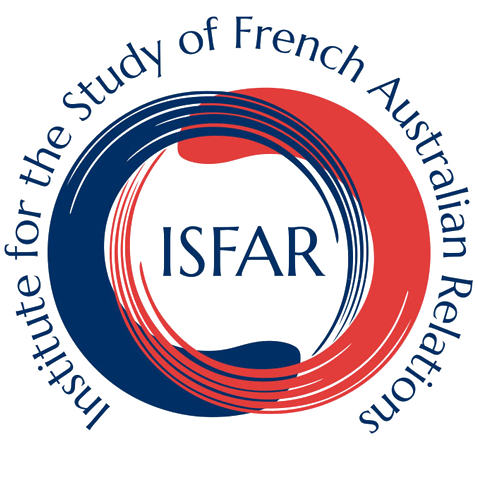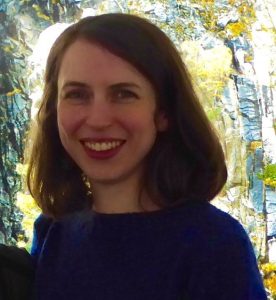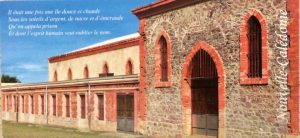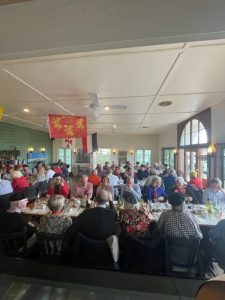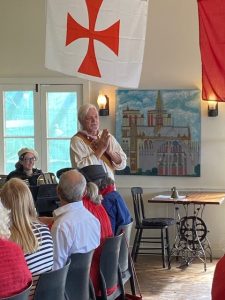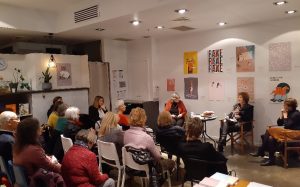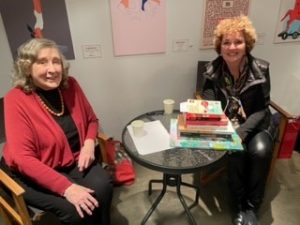Message from the President
We hope you are enjoying the milder weather, and for those who watched it, that you enjoyed the recent FIFA Women’s World Cup. Even for those who didn’t follow it closely, it would be difficult to be unaware that one of the stand-out matches of the championship was between Australia and France. While neither team ultimately made it to the final, both the Matildas and Les Bleues can be proud of their respective performances and for what they – and all the teams – achieved for women’s sport during this championship.
In this edition of the newsletter, you will find details of the recently published French Australian Review 74, as well as write ups of some recent events, including the Bastille Day French Festival in Melbourne, the 26th consecutive Bastille weekend at Tillermans Restaurant in New South Wales, and the latest Melbourne Salon. Also included is a summary of the developing French-Australian collaboration on gender equality, as part of the very welcome improved relations between our two governments.
This edition also includes a profile of new committee member Dr Briony Neilson, and the usual links to various French-related exhibitions, events, news articles and other items which we hope are of interest. Please note the article (in French) on the movement against the decision to remove les bouquinistes de Paris from the banks of the Seine for the Olympic Games in 2024; should you wish to add your name to the petition, the link is provided.
Please send through any suggestions and/or contributions for the newsletter to . Your feedback and ideas are always welcome.
Recent publication of The French Australian Review no. 74
Issue 74 of The French Australian Review has just been published. It is a fascinating issue with articles by both French and Australian writers and researchers.
This issue begins with Eric Berti’s response to Ivan Barko’s article in The French Australian Review, number 73, on Australia’s love-hate relationship with France. M. Berti was Consul-Général of France in Sydney from 2012 to 2015. He has returned to Paris where he is currently the internal mediator of the French Government’s Ministère des affaires étrangères and an Officier de la réserve citoyenne de la Marine française. In his opinion piece he presents his personal point of view on the vagaries of French-Australian relations. ISFAR greatly values the continuing interest and support of M. Berti.
An article by Paul Kiem introduces the Huyber and Loureiro families as a ‘Case Study in the History of Australia’s French Connection’. Their social and cultural influences on Australia, especially during the decades around Federation, were significant, and exemplified through the writings of Jessie Couvreur (Tasma) and the paintings of Artur Loureiro. The second part of their story will appear in the next issue of the journal.
Elizabeth Rechniewski has written an article on Louise Michel, who was deported to Noumea in the 1870s for her role in the Paris Commune. During her seven years in New Caledonia, she came to know the Kanak people very well and wrote about them, their culture and their land, and she recorded many of their stories. The article documents the role of the deportees in setting up the first theatres in Noumea and the islands – interestingly, some of the plays were written by deportees and Rechniewski’s article focuses on a play that Louise Michel probably wrote in New Caledonia but which was not published until after her death in 1905. In the play, Civilisation : [Scènes de la vie des primitifs au 20e siècle], Michel addresses directly and satirically the nature of the ‘civilisation’ that the Europeans have brought to the Pacific.
Of significant interest is the article by highly respected French anthropologist Barbara Glowczeski, who has worked with the Warlpiri people since the mid-seventies. Her article ‘From Academic Heritage to Aboriginal Priorities: Anthropological Responsibilities’, describes how she began this work and its subsequent development, stressing the fact that she has always believed in the importance of giving precedence to Aboriginal priorities rather than to academic trends.
In 2015–16, The French Australian Review published an article by Maryline Brun tracing the history and geography of Australian Studies in France. Deirdre Gilfedder, who is an Australian-born academic working at the University of Paris-Dauphine has, with the assistance of Matthew Graves, Maryline Brun and Salhia Ben Messahel, updated that earlier study and, through her analysis of the difference between the French and Australian university systems, has pointed out the diverse streams of study – literature, anthropology, ‘civilisation’ and other disciplines such as architecture – in which Australian Studies are found in French universities. Gilfedder writes that ‘while there is no specific discipline of Australian Studies in France comparable to those in Australia, nor is there an institute that could compare, for example, to the Menzies Centre at Kings College London, there is widespread interest in the country across English departments as well as in political science and anthropological research centres. This is an important document, identifying the many lecturers, disciplines and universities contributing to Australian Studies in France in 2023.
The French-Australian Encounter (number 9) is an interview with Mireille Vignol, who lived in Australia for eighteen years, working as a journalist for the ABC. Since her return to France in 2002, she has translated over sixty works by Australian writers as well as books by writers from Oceania, North America, South Africa and England. More recently she has been organising ‘Translation Slams’ (or ‘joutes’ as they are called in France).
A tribute to long-serving and valued member of the ISFAR committee, Comte Jacques Henri Pollet de Saint-Ferjeux precedes book reviews, a book note and the comprehensive Bibliographical Notes, compiled by Elaine Lewis for each issue.
Copies of The French Australian Review and/or individual articles are available for purchase at https://www.isfar.org.au/journal/.
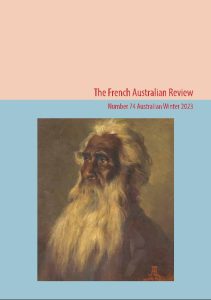
Cover of The French Australian Review, Number 74
The Melbourne Bastille Day French Festival
On the weekend of 8 and 9 July, the Melbourne Bastille Day French Festival provided the perfect opportunity to celebrate the Fête Nationale. A section of Melbourne’s iconic Queen Victoria Market was temporarily transformed, recreating the sights, smells, sounds and tastes of a wintry French market. The French and francophone community, francophiles and the wider public came together to celebrate all things French, with an estimated 30,000 people attending the event. They enjoyed mouth-watering French cuisine, were entertained by French musicians and performers, and discovered the offerings of local French-Australian businesses.
Held over several days, and covering five different venues, the Festival also included the Lumières talks, a series of presentations on fashion, history, sport, art and science, as well as a photography competition. Festival attendees enjoyed masterclasses in wine and cheese, French spirits, the secrets of French style, fragrance and even a mime class. The Alliance Française offered free French lessons, and the walking tours highlighting French Icons of Melbourne were also very popular.
The Melbourne Bastille Day French Festival aims to provide a forum for connection – for individuals, businesses, educational organisations, and the French Associations. In this context, ISFAR was delighted to maintain its involvement with the festival again this year. This time our contribution was an online quiz. By correctly answering just a few questions, participants could be in the running to win a discovery pass for the Melbourne International Film Festival. Congratulations to the winner, ISFAR member Sabrina.
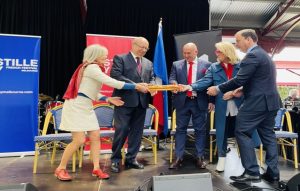
The ‘breaking of the baguette’ signalled the official opening of the Festival
Left to Right: Myriam Boisbouvier-Wylie, Honorary Consul-General for France in Melbourne; His Excellency Jean-Pierre Thébault, Ambassador of France to Australia; Victorian MP Wayne Farnham, representing the Leader of the Opposition, John Pesutto; The Right Honourable Lord Mayor Sally Capp; The Hon Colin Brooks MP, Victoria’s Minister for Multicultural Affairs
Credit: Melbourne Bastille Day French Festival
French café style at the Bastille Day French Festival
Credit: Melbourne Bastille Day French Festival
To find out more about the Melbourne Bastille Day French Festival, visit the site.
If you are interested in participating or volunteering at next year’s festival, please get in touch!
Profile: Dr Briony Neilson, ISFAR Committee Member
Credit: Briony Neilson
I am a historian and professional editor, currently affiliated with the History department at the University of Sydney. I have a PhD in history from the University of Sydney, with a thesis that examined the origins of the juvenile justice system in France at the turn of the twentieth century within the context of shifting ideas about childhood and adolescence as crucial and distinct stages of development. That research will soon appear in my first book (under contract with McGill-Queen’s University Press). I have presented my research at various conferences and seminars in Australia, France, the United Kingdom and the United States, and have an affiliation with the Centre pour les humanités numériques et l’histoire de la justice (CLAMOR) in Paris. Since 2019 I have held the position of editor of French History & Culture, the peer-reviewed journal of the George Rudé Society, Australasia’s association for the study of French history.
As a historian, I have an enduring interest in themes of crime, criminal justice, incarceration, and marginalised people in modern France and the French empire. It would make for an entertaining story to claim that it was watching François Truffaut’s Les 400 coups or reading Michel Foucault’s Surveiller et punir that first ignited my interest in these themes. And perhaps there’s some grain of truth to it. But pathways are never simple or direct. Certainly, I’ve always had a great interest in foreign languages and learning about other cultures. As an undergraduate student at university, I was fortunate to have excellent teachers who fostered my passion for languages (French and Russian) and history.
After graduating with a first-class Honours degree in history, I managed to get a fixed-term position teaching English at the University of Paris III Sorbonne-Nouvelle which enabled me to spend several years living in France, further developing my language skills, doing a lot of reading and research in the futuristic fortress known as the Bibliotheque nationale de France (Tolbiac), and generally relishing the extraordinary array of cultural, intellectual, and political activities the city has to offer. Those were unforgettable years and I can’t imagine a better preparation for then returning to Australia to embark on a PhD in French history.
Since completing my PhD I have held numerous fixed-term teaching and research positions at Australian universities. I’ve published my research in various scholarly journals, including the International Review of Social History; Australian Journal of Politics and History; Crime, History & Societies; and Modern and Contemporary France. I’m also a highly experienced editor, employed on a freelance basis by various scholarly publishers.
It is my specialisation in the history of France’s penal colony (or bagne) in New Caledonia that most closely dovetails with the interests of ISFAR. My research in that area has examined the connections between the New Caledonian bagne and Australia’s convict and settler histories, and over the years I have taken part in several ISFAR events on these themes and published work in the French Australian Review. In 2023 I became a member of the ISFAR committee and I look forward to furthering my engagement with the group and fellow members to support the study of French-Australian relations.
News from our members
New Caledonia – a society shaped by its colonial legacies
Building constructed by convicts at l’île Nou, Nouville, near Noumea
“Once upon a time…” – a familiar way of evoking memories and stories of people, places, events and times past.
Interestingly, one often finds inconsistencies, unexplained gaps, sometimes secrets, taboos or lies in the retelling of events at all levels – familial, social and political – that can mask a darker side, leading one to reflect on the motivations that caused people to do the things they did.
My personal reflections on this theme began some years ago when, delving into my family history, I discovered that my maternal grandmother was born in New Caledonia. She was one of five children born to a couple married at Bourail, a penal settlement some 150 kilometres northwest of Noumea, after serving their sentences as convicted thieves transported from France in the late 1870s.
During a visit in 2018, I uncovered a number of significant leads and resources for both the familial aspects and more general perspectives on the history of New Caledonia. One of these was a book published in 1990 which deals with the experiences of the largely forgotten women who served their time as convicts in New Caledonia and Guyane. The book was written by Odile Krakovitch and is entitled Les femmes bagnardes (ISBN 2-262-01501-5).
Recently I came upon an interview with Krakovitch dating from the time of the book’s publication. It appears that the interviewer uploaded the interview to YouTube in 2021.
Watching and listening to the author – albeit a perspective from some 30 years ago – has been extremely interesting for me in the context it offers for further reflection on the circumstances that framed the lives of my maternal ancestors. A particular theme that has emerged in my research is a certain opacity, indeed a sometimes a deliberate forgetting of matters relating to the convict period in New Caledonia, and, more broadly, certain sensitivities in discussions about the legacies of colonisation.
As I reflect on my journey so far, it strikes me that there are parallels with our current situation here in Australia as we come to terms with questions of identity and sovereignty and contested histories arising from our particular colonial past. Large questions undoubtedly, but is not history – in all its forms – about people and the ways in which their lives are shaped by circumstance? Certainly, a useful touchstone as I continue to build the narrative of my family’s history.
Jenny Williams
26th consecutive Bastille weekend at Tillermans Restaurant, NSW
Our restaurant, Tillermans, situated in Tea Gardens on the Mid North Coast of New South Wales, recently celebrated its 26th consecutive Bastille weekend. Born out of interest from the Myall U3A, the festival this year attracted over 150 francophiles. Numbers were a far cry from the pre-pandemic high of 450 participants in 2019 but much higher than the groups of up to 30 who gathered during lockdown. French cuisine and specially imported wines are always featured, along with singing and a general knowledge quiz. This year entertainment was provided by accordionist Laura Bishop, whose rendition of Piaf’s ‘Non, je ne regrette rien’ left everyone dreaming of France, especially those joining us on our annual tour of the Dordogne.
Peter and Kerry Hodges
Enjoying Bastille weekend at Tillermans
Credit: Vikki Atkins
Accordionist Laura Bishop with Peter Hodges at Tillermans Bastille weekend
Credit: Vikki Atkins
The Melbourne Salon
The Melbourne Salon of 26 July April was entitled Foreign Language Bookshops: the inside story, and featured Jillian Symons, Managing Director of Intext Book Company Pty Ltd/Language International Bookshop and Elaine Lewis, former owner and manager of The Australian Bookshop in Paris.
Both Jillian and Elaine have both done an enormous amount to promote foreign language books and cultures in Australia and in France over the years, and this was a chance to celebrate their achievements in the industry. The audience was treated to a delightful evening of stories and insights into the world of bookshops, book sales, publishing, and all things books.
Elaine Lewis and Jillian Symons in conversation
Credit: Aude Sowerwine
Save the date! The next Melbourne Salon will be held on 25 October – details will be forwarded closer to the time.
French-Australian collaboration on gender equality?
Since the election of the Albanese government, great strides have been made in improving relations with France, with the two countries issuing a series of significant joint communiques setting out a ‘bilateral roadmap’ to guide future cooperation on every aspect of foreign policy: political, military, security, human rights.
Hugh Piper and Alice Ridge, authors of a recent report by the AP4D Institute (Asia-Pacific Development, Diplomacy and Defence Dialogue), Enhance Coordination with France in the Indo-Pacific, highlight an additional area for cooperation: that of promoting gender equality in the region. France has had a commitment to a feminist foreign policy since 2019, including in the areas of ‘reduction of inequality, sustainable development, peace and security, defence and promotion of fundamental rights, and climate and economic issues’. France was the first permanent member of the UN Security Council to adopt this approach; other countries include Germany, Canada, Spain and most recently Chile. While France has played an important role in raising equality issues in international forums, including through its 2019 G7 presidency and 2022 EU presidency, the official report on its practice notes that it is ‘insuffisamment définie, portée et financée’.
Australia too is increasingly including gender equality goals in its foreign policy and aid programmes. On 20 December 2022, Minister for Foreign Affairs Penny Wong appointed Stephanie Copus Campbell AM as the Ambassador for Gender Equality, reaffirming ‘the Government’s commitment to advancing the human rights of women and girls, particularly in the Indo-Pacific region’.
The issues raised by such policies are complex and controversial: does gender preference in aid ignore cultural difference, provoke a backlash against women or disadvantage men; should LGBTQI+ rights be explicitly included? Sweden was the first country to adopt a feminist foreign policy but its new centre-right government has abandoned the term if not all of the policies.
This ongoing live debate can be followed at:
Hugh Piper and Alice Ridge, ‘Australia’s Opportunity to Work with France on Gender Equality’, 25 July 2023, Australia Institute of International Affairs, access here.
‘Diplomatie féministe : passer aux actes’, 3 July 2023, report of the Haut Conseil à l’Egalité, access here.
Melissa Conley Tyler, ‘The Case for a Feminist Foreign Policy’, 8 March 2022, ASPI, access here.
‘Ambassador for Gender Equality’, 20 December 2022, DFAT, access here.
‘Feminist Foreign Policies: An Introduction’, UN Women, access here.
Links to current and upcoming events and exhibitions
Visit the 2023 Melbourne Winter Masterpieces exhibition ‘Pierre Bonnard: Designed by India Mahdavi’ at the National Gallery of Victoria, until 8 October 2023. The exhibition features more than 100 works by Bonnard, presented within a contemporary scenography by award-winning architect and designer India Mahdavi.
Also not to be missed is the exhibition ‘Chagall‘ presented by the Jewish Museum of Australia: Gandel Centre of Judaica, until 10 December 2023.
For more French related events visit the Sacreblue website or Facebook page
Items of interest
In July Dr Angélique Stastny gave a lecture at the National Library of Australia about her 2021 National Library Fellowship research into anti-colonial activist publications in Australia and the Pacific in the late 1960s and 1980s. Her lecture can be viewed through this Youtube link.
The Conversation published an article by Paul Gibbard on his research into the life and work of French botanist Théodore Leschenault who travelled to Australia on the Baudin expedition in the period 1800–1803, and whose original journal from the voyage was discovered and put up for auction in 2016.
Le Monde of 16 July marked the death of French singer and actress Jane Birkin with a long article about her life and career. The article can be accessed here.
Le Monde of 9 August published an article on the movement against the decision to remove les bouquinistes de Paris from the banks of the Seine for the Olympic Games in 2024. The article can be accessed here. A separate article on change.org provides a link to the online petition.
Le Monde of 5 March published a review of Ali Cobby Eckermann’s verse novel Ruby Moonlight, translated into French by Mireille Vignot.
AALITRA in association with CO.AS.IT will be presenting ‘Translating Poetry. A Symposium’ on Thursday 28 September in Carlton. Translations from French will be part of the discussion. Those interested in attending can register here.
Le Figaro of 31 August reported on the visit to New Caledonia by a delegation of Australian politicians to learn about the customary Senate’s experience in providing advice to the New Caledonian government and congress on issues affecting the Kanak population, in advance of the referendum on the Australian Constitution to be held on 14 October.
Visit Blue Blanc Rouge for French and Francophone news and information, and links to a wide range of French-related organisations.
